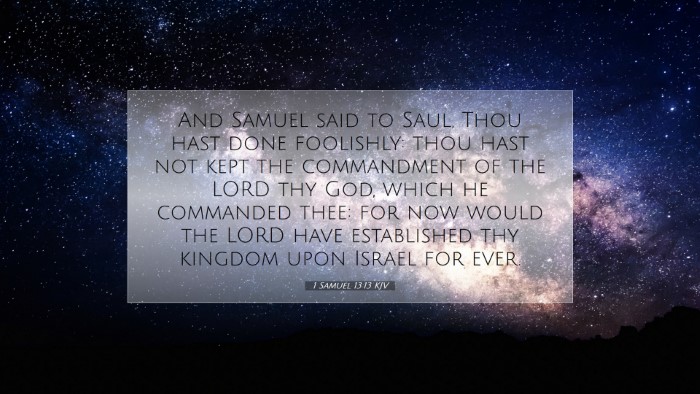Commentary on 1 Samuel 13:13
Verse Reference: 1 Samuel 13:13 - "And Samuel said to Saul, 'You have done foolishly. You have not kept the commandment of the Lord your God, which He commanded you. For now the Lord would have established your kingdom over Israel forever.'
Contextual Background
This passage occurs in the midst of Israel's transition from theocratic leadership under judges to monarchic rule under Saul. Samuel, the prophet and judge, plays a critical role as the spiritual leader during this pivotal shift. Saul, having been anointed by Samuel, is faced with a critical situation regarding an impending battle against the Philistines.
Theological Implications
The statement by Samuel is profound and speaks to the consequences of disobedience to God’s commands. This illustrates a fundamental theme in biblical theology: the importance of covenant fidelity and the ramifications of straying from divine directives.
Divine Authority and Human Agency
Saul’s foolishness is highlighted in the context of divine authority. By acting contrary to God’s instructions, Saul not only jeopardizes his own rule but also reflects on the broader implications for Israel itself. This leads to a discussion of the human responsibility within the covenant relationship with God.
Commentary Insights
Matthew Henry's Perspective
Henry emphasizes the gravity of Saul’s actions, indicating that the "foolishness" mentioned by Samuel stemmed from impatience and lack of faith. Saul's failure to await God's timing is a recurring theme in Scripture and serves as a warning for believers regarding the dangers of presumption and disobedience.
Albert Barnes’ Analysis
Barnes notes that God desired to establish Saul's dynasty over Israel, reflecting God's intention for leaders to govern justly and according to His will. Saul’s disregard for the divine command reveals a profound misunderstanding of his role as king. Barnes articulates that the rejection of Saul's kingship was imminent and inevitable due to this act of disobedience.
Adam Clarke's Commentary
Clarke adds depth to the discussion by explaining the cultural and religious significance of waiting for the prophet to offer sacrifices before battle. He points out that Saul’s haste not only displayed a lack of faith but also a misunderstanding of the sacred protocols established by God. His actions reflect a broader human tendency to bypass divine requirements for immediate gain.
Lessons for Leadership
This passage serves as a critical reminder for contemporary leaders, both in the church and in secular contexts, about the importance of seeking God's guidance and adhering to His commands. Saul's rejection highlights the necessity of humility, obedience, and the acknowledgment of one's limitations when in positions of power.
The Role of Faith in Decision Making
Saul's decision, driven by fear and impatience, serves as a case study on the importance of faithfulness in leadership. Christian leaders are called to trust in God's provision and timing, especially when faced with challenging situations. The narrative encourages leaders to approach decisions with prayerful consideration and a reliance on God’s Word.
Relevance to Today’s Believers
1 Samuel 13:13 is not merely a historical account; it resonates with modern believers facing similar struggles with impatience, fear, and challenges to faith. The overarching message emphasizes the need for obedience to God’s commands in all aspects of life.
Call to Reflect
- Examine our impatience: Are we waiting on God in our decisions, or are we taking matters into our own hands?
- Faith in the face of adversity: How do we react when faced with pressure and uncertainty? Do we trust God's timing?
- The impact of leadership: Leaders must embody the principles of obedience and reliance on God, setting an example for others to follow.
Conclusion
In conclusion, 1 Samuel 13:13 serves as a compelling reminder of the importance of obedience and the need for leaders to remain steadfast in their commitment to God. The repercussions of Saul's actions teach us about the significance of divine authority and the gravity of our choices. As we continue to study this passage, may we be encouraged to reflect on our own lives and seek a deeper relationship with the Lord, embracing His timing and commands in all that we do.


